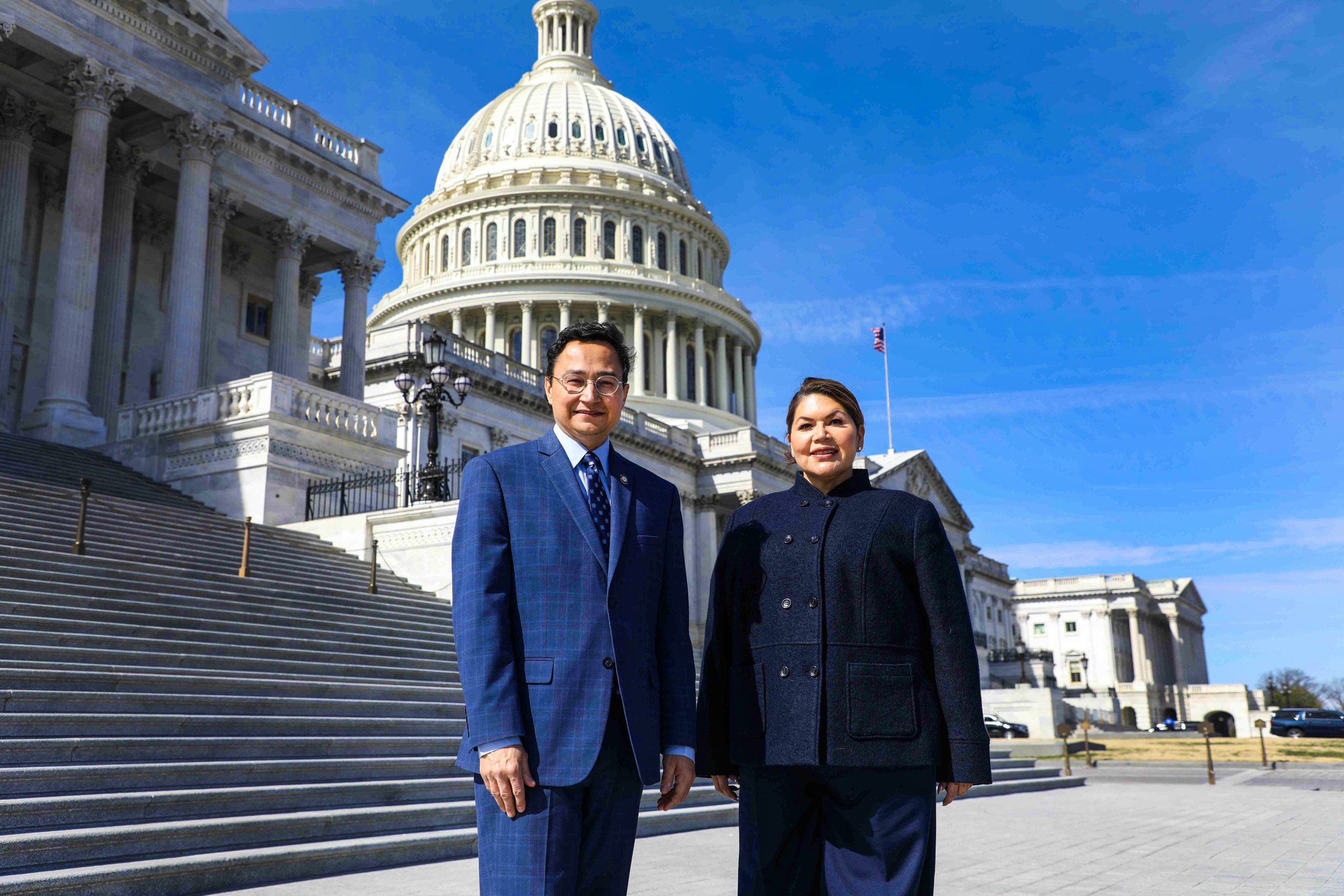Indianz.Com > News > Congress returns to work after big election by inching toward historic tribal delegate

Congress returns to work after big election by inching toward historic tribal delegate
Monday, November 14, 2022
Indianz.Com
WASHINGTON, D.C —
Votes are still being counted from last week’s historic election in which Democrats retained control of the U.S. Senate following widespread fears of a Republican “red wave” that never truly materialized.
But while the U.S. House of Representatives remains in play, Democrats are still in charge of the chamber for the remainder of the 117th Congress. And as lawmakers return to work this week, they are using their power to take up a tribal rights issue that could help their party make history once again in the nation’s capital.
On Wednesday, the House Committee on Rules is taking the first step toward seating a tribal government delegate in the chamber. More specifically, the hearing focuses on what it would take to finally bring the Cherokee Nation into the halls of power on Capitol Hill, nearly 200 years after the United States made such a promise by treaty.
“After appointing a Delegate to Congress in 2019, and many visits to Congress for outreach and education on our 1835 treaty rights, we are elated that a congressional hearing on our Cherokee Delegate has been set for Wednesday,” Principal Chief Chuck Hoskin Jr. said in a statement, issued while he was in Washington, D.C., last week as the U.S. Supreme Court took up a long-running Indian Child Welfare Act case.
Also in town for the hearing in Haaland v. Brackeen was Kim Teehee, a Cherokee citizen who has been designated by the tribe to serve as its delegate in the House of Representatives. The former Congressional staffer and former White House adviser plans to accompany Hoskin to the long-anticipated hearing. “Delegate Teehee and I look forward to attending this monumental hearing for all of Indian Country in which we take the step forward in getting Kim Teehee seated and ensuring the United States keeps its word to our tribe,” the chief said. The Cherokee Nation is invoking the 1835 Treaty of New Echota in its quest to maintain an official voice in the U.S. Congress. Article 7 of the government-to-government agreement asserts that the tribe “shall be entitled to a delegate in the House of Representatives of the United States whenever Congress shall make provision for the same.” In fact, a provision for Congress to seat a tribal delegate surfaced as the treaty was eventually signed in New Echota, the capital of the Cherokee Nation at the time. Although the bill was tied to the eventual removal of the tribe on what would later be known as the Trail of Tears, it marked the first known recognition of the need to bring the voices of tribal government to the U.S. Capitol. “Today, we have several American Indian and Alaska Natives (AI/AN) in Congress but what we don’t have is a voice in Congress to speak to our unique interests,” Aaron Payment, the former chair of the Sault Ste. Marie Tribe of Chippewa Indians and former vice president of the National Congress of American Indians, aid in an opinion on Indianz.Com last month.Cherokee Nation Principal Chief @ChuckHoskin_Jr issues a statement regarding next week's congressional hearing on the efforts to seat our Cherokee Delegate to Congress:#SeatKimTeehee #CherokeeDelegate pic.twitter.com/UpuiDkWuQh
— Cherokee Nation (@CherokeeNation) November 9, 2022
The hearing on the Cherokee Nation’s delegate takes place at 10am on Wednesday in Room H-313 of the U.S. Capitol building. Three witnesses are on the witness list:Ahead of next Wednesday's meeting entitled “Legal and Procedural Factors Related to Seating a Cherokee Nation Delegate in the U.S. House of Representatives,” we wanted to announce our panel of witnesses.
— House Rules Democrats (@RulesDemocrats) November 10, 2022
Head to our website to learn more: https://t.co/XesMwyzkM1 pic.twitter.com/Kg1M5SY6W4
Chuck Hoskin Jr.
Principal Chief, Cherokee Nation
Tahlequah, Oklahoma Professor Lindsay Robertson
Chickasaw Nation Endowed Chair in Native American Law
College of Law at the University of Oklahoma
Norman, Oklahoma Mainon A. Schwartz
Legislative Attorney, Congressional Research Service
Washington, D.C.
Should Teehee be seated as a tribal delegate, her presence would boost the number of American Indians, Alaska Natives and Native Hawaiians in Congress, which is due to drop considerably from a historic high of six in the current session. So far, only three Native people are expected to return to the House for the 117th session.
Rep. Sharice Davids (D-Kansas), a citizen of the Ho-Chunk Nation, easily won re-election in her district last week. Rep. Mary Peltola (D-Alaska), who is Yup’ik and is the first Alaska Native person to secure a seat in Congress, is leading in unofficial returns but is not yet confirmed as the winner due to changes in the way elections are conducted in the 49th state.
Kai Kahele (D-Hawaii) won’t be returning to the House after he did not seek re-election — instead mounting an unsuccessful run for governor of Hawaii. He was the first Native Hawaiian in the chamber.
Principal Chief, Cherokee Nation
Tahlequah, Oklahoma Professor Lindsay Robertson
Chickasaw Nation Endowed Chair in Native American Law
College of Law at the University of Oklahoma
Norman, Oklahoma Mainon A. Schwartz
Legislative Attorney, Congressional Research Service
Washington, D.C.
House Committee on Rules Notice
Legal and Procedural Factors Related to Seating a Cherokee Nation Delegate in the U.S. House of Representatives (November 16, 2022)
Related Stories
Search
Filed Under
Tags
More Headlines
Senate Committee on Indian Affairs sets business meeting and hearing
Native America Calling: Saving historic architecture and other important places
VIDEO: H.R.2400, the Pit River Land Transfer Act of 2025
VIDEO: H.R.3620, the Southcentral Foundation Land Transfer Act of 2025
VIDEO: H.R.2815, the Cape Fox Land Entitlement Finalization Act of 2025
AUDIO: H.R.2400, the Pit River Land Transfer Act of 2025
AUDIO: H.R.3620, the Southcentral Foundation Land Transfer Act of 2025
AUDIO: H.R.2815, the Cape Fox Land Entitlement Finalization Act of 2025
Native America Calling: Native in the Spotlight with Randy Taylor
NAFOA: 5 Things You Need to Know this Week (December 15, 2025)
Chuck Hoskin: Cherokee Nation celebrates milestone in tribal gaming
Native America Calling: A Native entrepreneur’s view of the retail shopping season
VIDEO: H.R.2916, a bill to ratify the Akwesasne Mohawk Land Claim
VIDEO: H.R.2389, the Quinault Indian Nation Land Transfer Act
VIDEO: H.R.2388, the Lower Elwha Klallam Tribe Project Lands Restoration Act
More Headlines
Native America Calling: Saving historic architecture and other important places
VIDEO: H.R.2400, the Pit River Land Transfer Act of 2025
VIDEO: H.R.3620, the Southcentral Foundation Land Transfer Act of 2025
VIDEO: H.R.2815, the Cape Fox Land Entitlement Finalization Act of 2025
AUDIO: H.R.2400, the Pit River Land Transfer Act of 2025
AUDIO: H.R.3620, the Southcentral Foundation Land Transfer Act of 2025
AUDIO: H.R.2815, the Cape Fox Land Entitlement Finalization Act of 2025
Native America Calling: Native in the Spotlight with Randy Taylor
NAFOA: 5 Things You Need to Know this Week (December 15, 2025)
Chuck Hoskin: Cherokee Nation celebrates milestone in tribal gaming
Native America Calling: A Native entrepreneur’s view of the retail shopping season
VIDEO: H.R.2916, a bill to ratify the Akwesasne Mohawk Land Claim
VIDEO: H.R.2389, the Quinault Indian Nation Land Transfer Act
VIDEO: H.R.2388, the Lower Elwha Klallam Tribe Project Lands Restoration Act
More Headlines
